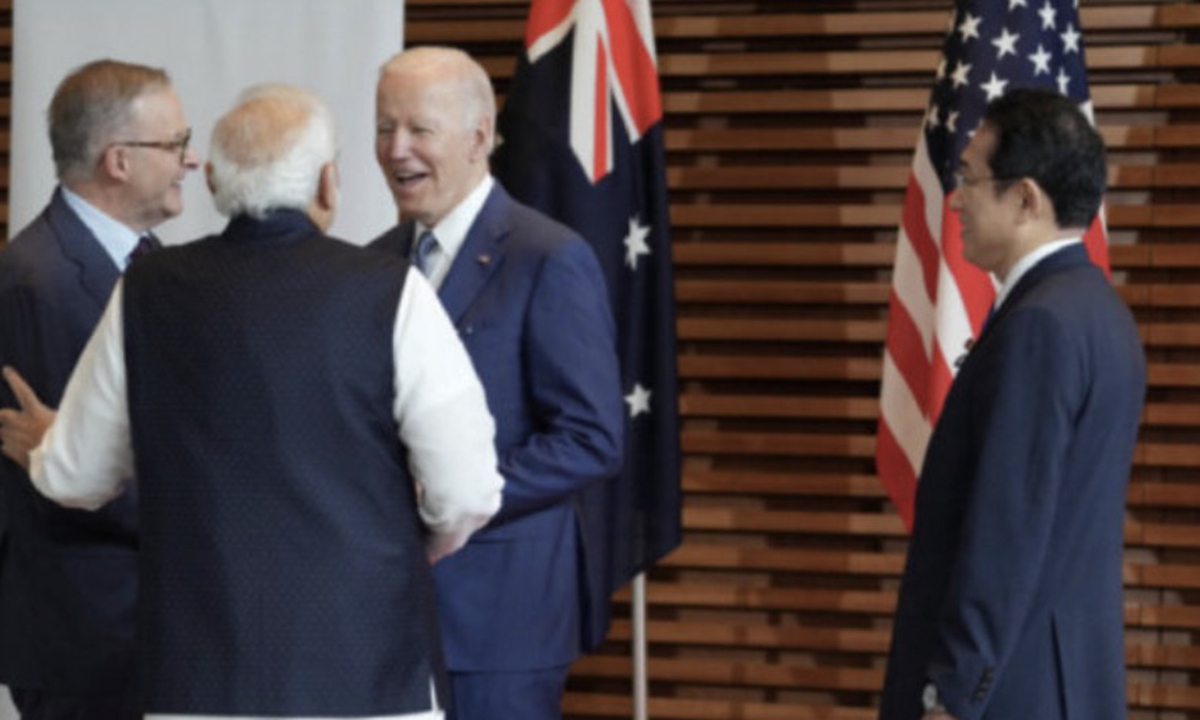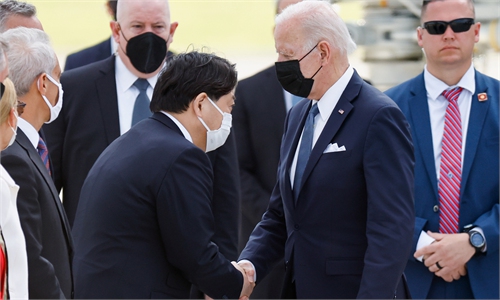
Photo: AFP
Japanese Prime Minister Fumio Kishida held talks with US President Joe Biden on Monday and hosted the offline Quad leaders' summit on Tuesday. In the Japan-US joint leaders' statement and the Quad joint leaders' statement, there are many topics involving China. Japan's attempt to follow the US and unite Indo-Pacific countries to contain China has entered a new stage.The focus of the Japan-US leaders' meeting and the Quad leaders' summit will be military security and economic cooperation. In the Indo-Pacific region, military security has always been the US' strength, whereasn economy is its weakness. Japan is just the opposite. But this summit seems to have reversed the positions of the US and Japan. The US has started to dominate economic issues and announced the establishment of the Indo-Pacific Economic Cooperation Framework (IPEF), while Japan has stated that it will strengthen military and security forces. But indeed, both economy and security are discussed on the basis of containing China.
In military security, Kishida said "I stated my determination to fundamentally reinforce Japan's defense capabilities and secure a substantial increase in the defense budget needed to effect this change." The Liberal Democratic Party in April recommended that the government should raise defense budget to 2 percent of GDP within five years. This is also the defense budget standard for NATO member states.
Japan emphasizes improving its say and ability to act in military security. Breakthroughs in military security are a part of Japan's ambition toward becoming a military great power again. To a certain extent, raising its defense spending to 2 percent of its GDP is to declare its breakthroughs in military defense forces, in order to seek amending the constitution. Besides, only a strong and sustainable military security capability can make Japan's so-called free and open Indo-Pacific Strategy more feasible.
In the economic field, the establishment of IPEF is an important part. Since 15 countries including China and Japan launched the RCEP in 2021, and Japan has dominated the CPTPP, the US-advocated IPEF has made Japan's position complicated because it will dilute Japan's presence in the CPTPP and RCEP. Japan and the US have different views on regional cooperation. This time, the US has established this loose economic alliance on the grounds of supply chains. It is reasonable to believe that unless the US entrusts Japan with economic leadership in the Indo-Pacific region, it will be difficult for IPEF to play an important role. Japan will not ignore RCEP and CPTPP. The IPEF has not been voted ratified by parliament, and it is not a treaty. If there is change of administration, then the sustainability of IPEF is doubtful. This is also the reason why Japan is not so active about concerning the framework.
And on regional hotspot issues, the US and Japan also have obvious differences. Japan seeks breakthroughs in military security, its demands on regional hotspot issues are different from those of the US. For example, when it comes to the Taiwan question, Biden said after the summit that the US would intervene militarily if the Chinese mainland takes the island of Taiwan by force. This is regarded as the US' Taiwan policy is changing from strategic ambiguity toward clarity. But Japan has not followed blindly, avoiding being too high-profile on the issue.
Although Japan is keen to contain and confront China -it is an important reason why Japan has deepened its alliance with the US and its multilateral cooperation, Japan may not always blindly follow the US. Despite their same general goal of containing China, their specific ways methods are different, considering with different geopolitical considerations. How to take advantage of these potential differences between the US and Japan is obviously also a test of China's diplomatic wisdom.
The author is an associate research fellow at the Center for Japanese Studies, Fudan University. opinion@globaltimes.com.cn

